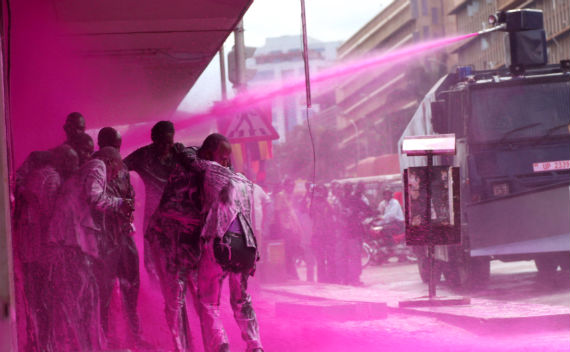Uganda: Museveni’s Power
More on:

Uganda’s governance is on a downward spiral, and Yoweri Museveni, the Big Man president, may be in trouble. Already in power for twenty-five years, Museveni has been spending money profligately on prestige projects while food and fuel prices continue to rise. The Ugandan leader has reportedly spent millions in public money to conduct his less than credible presidential re-election in February, allocated over $700 million to purchase six Russian fighter jets, and used an estimated $1.2 million to host his fifth-term inauguration tomorrow. Museveni reportedly invited Omar Al-Bashir to attend the ceremony, though it’s unclear whether or not the Sudanese leader will show. In the meantime, the Ugandan Bureau of Statistics released new figures that indicate a sharp increase in the official food inflation rate from 29.1 percent in March to 39.3 percent in April.
Last week, the Ugandan police beat and pepper sprayed the most prominent opposition politician, Kizza Besigye when he tried to take part in a peaceful anti-government demonstration. Subsequently, he went to Nairobi for medical treatment. He had planned to return to Entebbe and potentially participate in another anti-government demonstration this week. At the time of writing, however, Besigye was not on the last Kenya Airways flight out of Nairobi, as Ugandan authorities reportedly said they would not allow the aircraft to land if he was on it.
Despite pressure from the walk-to-work demonstrations and the deterioration in security, Museveni could muddle through. The Western media is concentrated in Kampala and Entebbe, so it is difficult to judge from its reporting the degree of disaffection in the rural areas. Museveni has also lashed out at the local press and some photo journalists have reported harassment, which may limit local media coverage of future demonstrations.
Ugandan politics also has a local character made up of multiple ethnic, regional and religious allegiances, so Museveni has built a robust patronage network to control the country—and remain in power. While Museveni may have ostensible support on certain issues (he did usher in free primary and secondary education in 1997 and 2007, respectively), his use of corruption and patronage politics allows him to control multiple, competing groups at the same time. To that end, it remains to be seen if the walk-to-work campaign has enough widespread support to override the incumbent’s patronage system--or whether it can promise anything markedly better in terms of services, jobs, and development. Given the brutal crackdown of late, it’s unclear whether the majority of Ugandans even believe Museveni can be toppled.
More on:
 Online Store
Online Store